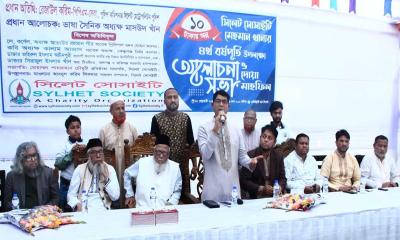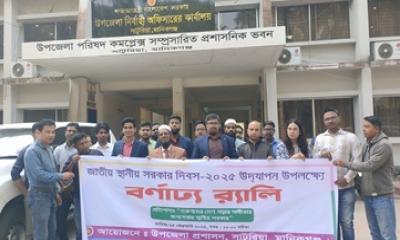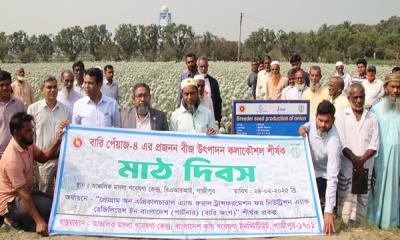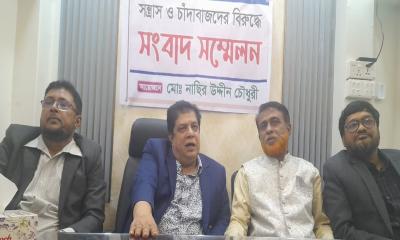Although stories of development in the country's information technology or IT sector are told developed, Bangladesh is actually lagging behind in this sector. The sector has also faced a crisis of image as the internet was shut down for several days during the latest anti-discrimination student movement.
Freelancers and entrepreneurs say that bringing back the image will be a big challenge. In order not to repeat such a situation in the future, the sector concerned call on the government to make preparations. The entrepreneurs said that the delivery could not be made against the orders of foreign customers due to internet disconnection for five consecutive days. They are facing financial loss. Not being able to respond at the right time has caused many freelancers to lose their ratings on the marketplace due to negative customer reviews. They are worried about how to overcome the pressure. It is known that currently there are about 3 lakh people involved in various activities including business process outsourcing, software development and design. Annual foreign exchange income from this sector is approximately 2 billion dollars.
According to the data of Bangladesh Association of Software and Information Services - BASIS, the loss in software exports alone is around Tk 500 crore due to lack of internet. That's why BASIS officials are talking about ensuring safe internet. They claim that even if foreign cables are cut, domestic trade will not stop, prepaid meters will not stop, e-commerce will not stop - such network design should ensure safe internet. Meanwhile, along with the outsourcing problem, the country's IT product exports have also decreased.
According to the data of Bangladesh Bank, from July to April of 2023-24 fiscal year, the export of telecommunication, computer and information services i.e. ICT services amounted to 531.8 million dollars; which was 5.2 percent less than the same period of the previous financial year. If the current trend of exporting IT products continues, the concerned parties fear that the income in this sector may decrease in the current financial year as well.
Those concerned say that Bangladesh's failure to build large IT institutions is a sign of the government's export diversification efforts. About 85 percent of the country's income comes from other sectors. Identifying the reasons for the decrease in income from this sector, the former president of BASIS, Fahim Mashroor said, the negative situation in software services is a bad sign. Exporters are benefiting as the dollar appreciates. The dollar has appreciated 35 percent in the past two years. Many exporters are not repatriating their earnings, fearing that the currency could weaken further as reserves continue to dwindle.
Meanwhile, domestic IT companies mainly work with startups. Because they are more inclined towards cheap outsourcing. Due to the global economic slowdown, startups are having trouble getting funding. As a result, they stopped upgrading or promoting new technology products. Lack of skilled human resources in advanced technologies such as artificial intelligence, data science and block chain is another reason for declining exports of IT products. Meanwhile, Bangladesh is lagging behind countries of similar economies including its neighbors in the progress index of the Information and Communication Technology (ICT) sector.
The United Nations International Telecommunication Union (ITU) released the ICT Development Index (IDI) 2024 last June. The index reviews the progress of ICT services in 170 countries of the world including Bangladesh. The index is based on data collected in 2022. Bangladesh scores 62 out of 100 in IDI 2024. IDI 2023 was released last December. Bangladesh's score was 61.1. That is, there has been little progress in Bangladesh. Bangladesh is behind Myanmar, Sri Lanka, Maldives, Vietnam, and Bhutan in the index. Among its neighbors, Pakistan is slightly behind Bangladesh. India is not included in the index.
The global average score in this year's index is 74.8. The average score for lower middle income countries is 64.8. Bangladesh is in the list of lower middle income countries. Accordingly, Bangladesh lags behind the global average and the average score of low-middle income countries. In 7 out of 10 indicators in the index, Bangladesh lags behind the average score of lower-middle-income countries. Bangladesh is in a good position in terms of mobile network coverage (3-G and 4-G). Apart from this, Bangladesh has done better than the average index of lower middle income countries in mobile internet traffic subscription (GB). However, Asia is lagging behind the Pacific.
The IDI Index primarily focuses on two factors - 'Universal Connectivity' and 'Meaningful Connectivity'. Universal connectivity connects people, families, communities and businesses. Bangladesh's score on universal connectivity is 39.4 percent. Three indicators of universal connectivity are individual internet usage, household internet usage and mobile internet users per 100 people. Bangladesh is very behind in these three.
ZH






